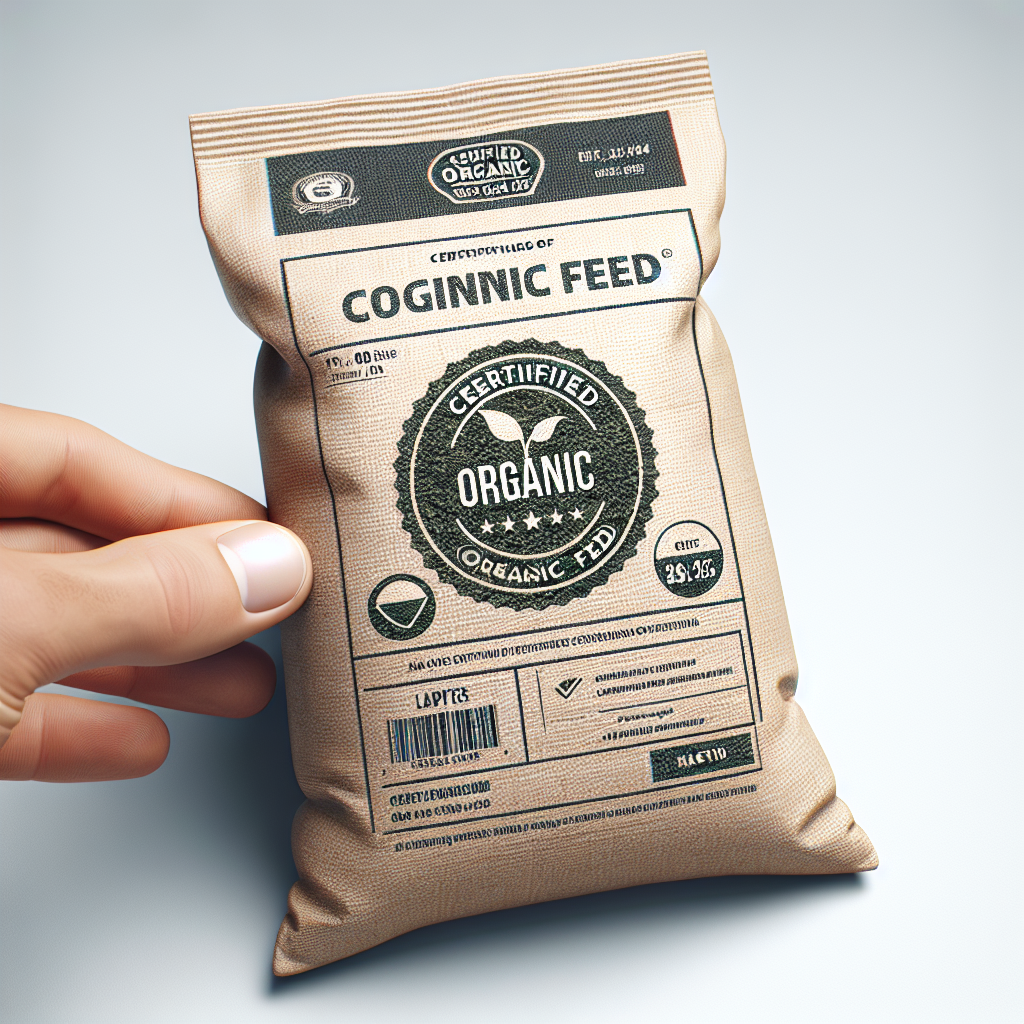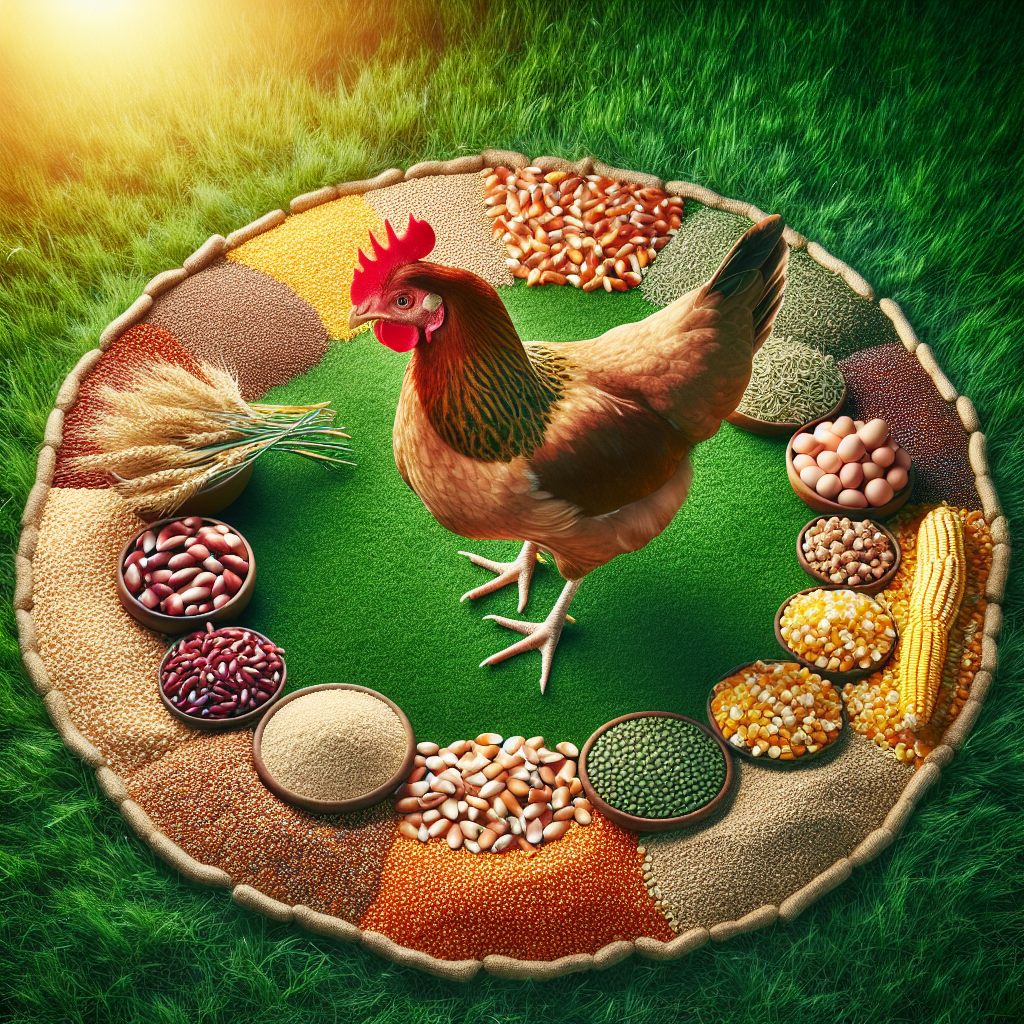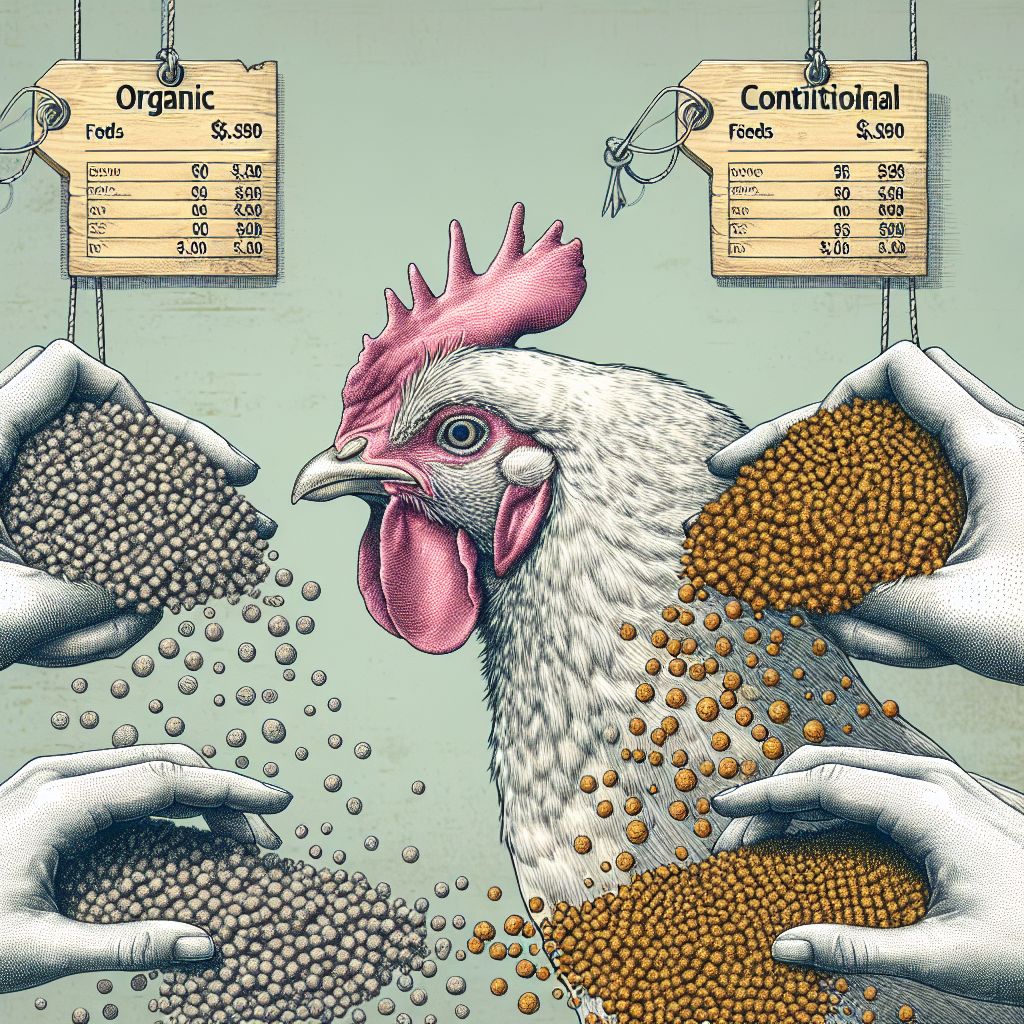So you’re all about going organic, huh? That’s great! But here’s the thing: when it comes to buying organic feed, you can’t just trust every label you see on the market. There’s a lot of fake stuff out there, trying to pass off as the real deal. But don’t worry, we’ve got your back. In this article, we’ll arm you with some handy tips on how you can ensure the authenticity of the organic feed you purchase. Let’s dive in!
Sources of Organic Feed
Certified Organic Suppliers
Certified organic suppliers are companies or farms that have gone through the organic certification process. These suppliers are inspected and assessed by certifying agencies to ensure they meet the standards set for organic feed production. By purchasing from certified organic suppliers, you can have confidence in the authenticity and quality of the feed you are buying.
Local Farmers and Co-ops
Local farmers and co-ops are another reliable source for organic feed. These farmers often follow organic farming practices but may not be certified organic due to the cost and paperwork involved. However, they still uphold the principles of organic farming, such as using natural fertilizers and avoiding synthetic chemicals. Buying from local farmers and co-ops not only supports the local economy but also allows you to directly communicate with the farmers and understand their farming methods.
Online Retailers
In the digital age, online retailers have become a convenient option for purchasing organic feed. Many reputable online retailers specialize in organic products and provide detailed information about the feed they sell. When choosing an online retailer, look for those that have a strong reputation, good customer reviews, and a transparent sourcing and certification process. Be cautious of unknown or unverified online sellers, as they may not provide authentic organic feed.
Feed Mills
Feed mills, which produce animal feed on a larger scale, can also be a source of organic feed. Some feed mills specialize in organic feed production and have the necessary certifications and quality controls in place. However, it is important to research and verify the specific feed mill you are considering. Look for mills that follow strict organic standards, source their ingredients from certified organic suppliers, and regularly test for contaminants.
Understanding Organic Feed Standards
Certification Process for Organic Feed
The certification process for organic feed involves various steps to ensure compliance with organic standards. The certifying agencies conduct on-site inspections, review documentation, and assess the suppliers’ adherence to organic farming practices. This process includes evaluating factors such as soil fertility, pest and weed management, and feed production methods. By understanding this certification process, you can have a better understanding of the rigorous standards that organic feed suppliers must meet.
Labeling and Packaging
When purchasing organic feed, it is important to pay attention to the labeling and packaging. Look for labels that clearly state “certified organic” or bear the logo of a recognized certifying agency. The packaging should also provide information about the feed’s ingredients and any other certifications or verifications it may have. By carefully examining the labeling and packaging, you can ensure that the feed you are purchasing is indeed organic.
Ingredients List
The ingredients list on the feed packaging is a crucial aspect in determining the authenticity of organic feed. Organic feed should contain predominantly organic ingredients, with limited or no use of synthetic additives or genetically modified organisms (GMOs). Take the time to review the ingredients list and familiarize yourself with the organic standards for animal feed. This will help you make informed choices when comparing different feed options.
Non-GMO Verification
In addition to being organic, some consumers prefer to purchase feed that is also verified as non-GMO. Non-GMO verification ensures that the feed does not contain genetically modified ingredients. Look for labels or certifications that indicate the feed is non-GMO verified, in addition to being certified organic. This provides an extra layer of assurance for those who prioritize feeding their animals non-GMO feed.
Third-Party Certifications
Some organic feed suppliers may also hold additional third-party certifications that attest to the quality and authenticity of their products. These certifications can include standards for animal welfare, environmental sustainability, or fair trade practices. While not directly related to the organic status of the feed, these additional certifications can be valuable in aligning with your personal values and supporting suppliers who prioritize holistic and ethical practices.
Researching and Verifying Suppliers
Check Certification Documents
To ensure the authenticity of the organic feed you purchase, it is essential to review the certification documents of the suppliers. Ask the supplier for copies of their organic certification and any other relevant certifications they may hold. These documents should provide detailed information about the certifying agency, the scope of certification, and the specific standards followed. Reviewing these documents will give you confidence in the authenticity of the feed and the supplier’s commitment to organic practices.
Contact Certification Agencies
If you have any doubts or questions about a particular supplier, consider reaching out to the certifying agency directly. Certifying agencies can provide additional information about the supplier’s certification status and any recent inspections or compliance issues. By contacting the certification agency, you can have a direct line of communication to address any concerns or verify the authenticity of the organic feed being sold.
Read Reviews and Testimonials
Online reviews and testimonials can provide valuable insights into the authenticity and quality of organic feed suppliers. Take the time to read through customer reviews and testimonials to learn about other people’s experiences with the supplier. Look for patterns or recurring themes in the feedback, and consider the overall satisfaction of the customers. However, keep in mind that reviews are subjective and may not always accurately reflect the supplier’s authenticity.
Visit the Supplier’s Farm or Facility
If possible, consider visiting the supplier’s farm or facility to gain firsthand knowledge of their operations. By seeing the farming practices, feed production process, and animal welfare measures in person, you can assess the authenticity and quality of the organic feed. During your visit, you can also interact with the supplier directly and ask any questions or concerns you may have. Visiting the farm or facility provides a deeper understanding of the supplier’s commitment to organic practices.
Comparing Organic Feed Brands
Price Comparison
When comparing organic feed brands, price is often a consideration. However, it is important to keep in mind that organic feed production involves higher costs due to the use of organic ingredients and adherence to strict standards. While price can be a factor, it should not be the sole determining factor. Consider the overall value and quality of the feed when comparing prices between different brands.
Nutritional Composition
An important aspect of comparing organic feed brands is evaluating their nutritional composition. Different animal species have specific dietary requirements, and finding a feed that meets those requirements is crucial for their health and well-being. Look for feeds that provide a balanced nutritional profile, including essential vitamins, minerals, and proteins. Compare the nutritional composition of different brands to ensure you are selecting the most suitable feed for your animals.
Customer Satisfaction
To gauge the customer satisfaction of organic feed brands, consider reading customer reviews and testimonials. Look for indicators of customer satisfaction, such as repeat purchases, positive feedback on the feed’s impact on animal health, or overall satisfaction with the brand’s customer service. Customer satisfaction can be a valuable measure of the feed’s quality and authenticity.
Sustainable Practices
Sustainable practices in organic feed production are another important consideration when comparing brands. Look for brands that emphasize sustainable farming methods, such as regenerative agriculture, water conservation, and reduced energy use. Sustainable practices contribute to the preservation of the environment and the long-term health of the land. Supporting brands that prioritize sustainability aligns with the principles of organic farming.
Animal Welfare Standards
Animal welfare is a crucial aspect of organic farming. When comparing organic feed brands, consider their commitment to high animal welfare standards. Look for brands that prioritize the well-being of the animals, including providing access to pasture, outdoor space, and proper living conditions. Supporting brands that uphold strong animal welfare standards promotes ethical and humane farming practices.
Checking for Contamination
Testing for Pesticides and Herbicides
One concern when purchasing organic feed is the potential contamination from pesticides and herbicides. While organic farming practices exclude the use of synthetic chemicals, it is still important to ensure that the feed is free of any residual contamination. Look for brands that conduct regular testing for pesticides and herbicides and provide documentation of these tests. This ensures that the organic feed is free from harmful chemical residues.
Testing for Genetically Modified Organisms (GMOs)
In some cases, organic crops can be contaminated by genetically modified organisms (GMOs) through cross-pollination or mixing during processing. To ensure the authenticity of organic feed, brands should conduct regular testing to verify that the feed is free from GMOs. Look for brands that provide documentation of GMO testing and have strict protocols in place to prevent contamination.
Heavy Metal Testing
Heavy metals such as lead, mercury, and arsenic can accumulate in crops and pose a risk to animal health. Brands that prioritize the safety of their organic feed conduct regular testing for heavy metals. Review the documentation provided by the brand to ensure that their feed meets safety standards for heavy metal contamination.
Mycotoxin Testing
Mycotoxins are toxic substances produced by fungi that can contaminate crops, including those used in organic feed production. Brands should conduct regular mycotoxin testing to ensure the safety of their feed. Look for brands that provide documentation of mycotoxin testing and adhere to strict standards for mycotoxin limits. By choosing brands that prioritize mycotoxin testing, you can ensure that the feed is free of these harmful substances.
Supporting Local and Transparent Supply Chains
Buying Directly from Local Farmers
One way to support local and transparent supply chains is by buying directly from local farmers. This allows you to have a direct relationship with the farmer and enables you to ask questions about their farming practices. By purchasing directly from local farmers, you can support the local economy, reduce the carbon footprint associated with transportation, and have confidence in the authenticity and quality of the organic feed.
Participating in Community Supported Agriculture (CSA) Programs
Community-supported agriculture (CSA) programs are another avenue for supporting local and transparent supply chains. In a CSA program, individuals or families purchase a share of a local farm’s produce, including organic feed. This direct-to-consumer model provides a clear understanding of the farm’s practices and allows for open communication between farmers and consumers. Joining a CSA program not only supports local farmers but also promotes transparency in the food system.
Joining Consumer Co-ops
Consumer co-ops are member-owned organizations that pool resources to purchase organic products, including feed, directly from suppliers. By joining a consumer co-op, you become part of a community of like-minded individuals who prioritize organic and sustainable practices. Co-ops often have strict sourcing standards and provide transparency about their suppliers. Joining a consumer co-op allows you to have a stake in the supply chain and support the authenticity of the organic feed you purchase.
Demanding Transparency from Suppliers
As a consumer, you have the power to demand transparency from suppliers. Reach out to suppliers and ask for information about their farming practices, certifications, and sourcing. Request documentation and seek clarity on any concerns or questions you may have. By demanding transparency, you encourage suppliers to be open about their practices and provide the necessary information to ensure the authenticity of the organic feed.
Communicating with Suppliers
Ask for Documentation
When communicating with suppliers, don’t hesitate to ask for documentation to verify their claims of organic certification. Request copies of their organic certification, GMO testing results, and any other relevant certifications or verification. Suppliers who are committed to transparency and authenticity will readily provide this information. Review the documentation carefully and seek clarification on any ambiguities or concerns you may have.
Inquire About Ingredient Sources
In addition to certification, it is important to understand where the supplier sources their ingredients from. Ask questions about the origin of the feed’s ingredients and whether they are sourced from certified organic suppliers. Knowing the source of ingredients allows you to trace the feed’s supply chain and ensure the authenticity of the organic feed.
Seek Clarification on Labeling
Labeling can sometimes be confusing or misleading, so don’t hesitate to seek clarification from suppliers. Ask specific questions about the labeling on the feed packaging to understand the standards and certifications it claims to meet. Seek clarity on any abbreviations or terms used on the label to ensure you fully understand the feed’s authenticity.
Express Concerns and Expectations
When communicating with suppliers, express any concerns or expectations you may have regarding the authenticity and quality of the organic feed. Share your values and ask how the supplier meets those values. Effective communication allows suppliers to understand consumer expectations and concerns, fostering a more transparent and authentic supply chain.
Staying Informed About Regulatory Changes
Follow Organic Certification Updates
Organic certification standards can evolve over time, with updates and changes to keep up with advancements in organic farming practices. Stay informed about organic certification updates by following reputable sources such as government agricultural departments, organic industry organizations, and certifying agencies. By staying up to date with the latest certification standards, you can make informed decisions when purchasing organic feed.
Stay Updated on GMO Regulations
Genetically modified organisms (GMOs) are a topic of ongoing discussion and regulation. Stay updated on GMO regulations by following reputable sources such as government agencies responsible for food safety and agricultural policies. Understanding GMO regulations allows you to assess the GMO testing and verification practices of organic feed suppliers and ensure the authenticity of the feed you purchase.
Join Organic Agriculture Associations
Joining organic agriculture associations can provide valuable resources and information about organic feed production and certification. These associations often offer educational materials, webinars, and conferences on topics related to organic farming. By becoming a member of these associations, you gain access to a community of experts and fellow consumers who prioritize organic practices and can help you ensure the authenticity of the feed you purchase.
Attend Workshops and Conferences
Attending workshops and conferences focused on organic farming and animal nutrition can expand your knowledge and keep you informed about the latest industry trends. These events often feature experts in organic feed production, organic certification, and sustainable agriculture. By attending these events, you can interact with industry professionals, ask questions, and learn about the best practices for ensuring the authenticity of the organic feed.
Supporting Local Organic Farmers
Explore Farmers’ Markets
Farmers’ markets are excellent venues to support local organic farmers. Visit your local farmers’ market to connect with farmers who prioritize organic practices and produce organic feed. Farmers’ markets allow you to have face-to-face conversations with the farmers, ask questions about their farming methods, and understand the authenticity of the feed they are selling. By purchasing from farmers’ markets, you can directly support local organic farmers and ensure the authenticity of the feed.
Join Community-Supported Agriculture (CSA) Programs
As mentioned earlier, participating in community-supported agriculture (CSA) programs not only supports local farmers but also provides an opportunity to purchase organic feed directly from them. CSA programs often offer a variety of organic products, including feed for different animals. By joining a CSA program, you can establish a closer relationship with local organic farmers, support their sustainable practices, and have confidence in the authenticity of the feed you purchase.
Participate in Farm-to-Table Initiatives
Farm-to-table initiatives promote direct connections between farmers and consumers. Look for farm-to-table restaurants or initiatives in your area that prioritize sourcing from local organic farmers. By patronizing these establishments, you support the local organic farming community and can have confidence that the feed used in their animal products is authentic and of high quality.
Share Feedback with Farmers
Providing feedback to local organic farmers is a valuable way to support their efforts and help ensure the authenticity of the feed they produce. Share your experiences and appreciation for their organic practices and the quality of their feed. Farmers often value direct feedback from consumers and can use it to improve their operations and meet consumer expectations. By engaging in open communication with farmers, you contribute to a transparent and authentic supply chain.
Conclusion
Ensuring the authenticity of the organic feed you purchase requires research, verification, and active participation in supporting local and transparent supply chains. By choosing certified organic suppliers, researching and comparing feed brands, checking for contamination, and communicating with suppliers, you can have confidence in the authenticity and quality of the feed. However, it is an ongoing process that requires staying informed about regulatory changes, supporting local organic farmers, and demanding transparency. By following these guidelines, you can make informed choices and contribute to a more sustainable and transparent organic feed industry.




